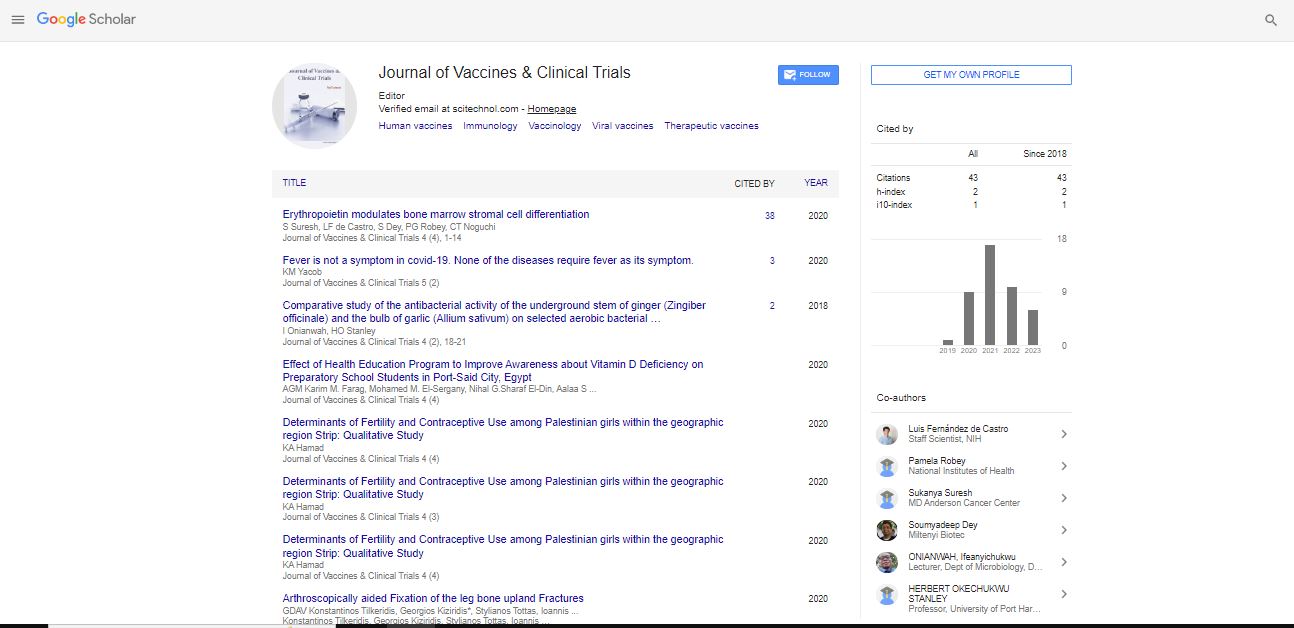Perspective, Jou Of Vac Cli Tr Vol: 7 Issue: 1
Development and Efficacy of Vaccines against Viral Infections
Dunphy Ana*
1Department of Microbiology and Immunology, Thomas Jefferson University, Philadelphia, PA 19107, USA
*Corresponding Author: Dunphy Ana
Department of Microbiology and Immunology, Thomas Jefferson University, Philadelphia, PA 19107, USA;
E-mail: annaphy45@gmail.com
Received date: 24 February, 2023, Manuscript No. JVCT-23-94634;
Editor assigned date: 28 February, 2023, PreQC No. JVCT-23-94634(PQ);
Reviewed date: 13 March, 2023, QCNo JVCT-23-94634;
Revised date: 21 March, 2023, Manuscript No. JVCT-23-94634 (R);
Published date: 30 March, 2023, DOI: 10.4172/JVCT.100068.
Citation: Ana D (2023) Development and Efficacy of Vaccines against Viral Infections. Jou of Vac Cli Tr 7:1.
Description
Viral infections pose a significant threat to global health, causing millions of deaths every year. Vaccines are an effective means of preventing viral infections and reducing their associated morbidity and mortality. This manuscript provides an overview of viral vaccines, including the development, efficacy, and types of vaccines used to prevent viral infections. We also discuss the challenges associated with the development of viral vaccines and the role of vaccines in public health.
Viral infections remain a significant public health concern, causing millions of deaths worldwide. Vaccines have been an important tool in preventing viral infections, reducing the burden of infectious diseases globally.
Viral vaccine development
Viral vaccine development involves several steps, including the identification of the viral pathogen, the selection of an appropriate vaccine platform, and the optimization of vaccine production. The viral pathogen is identified based on its ability to cause disease, and the selection of an appropriate vaccine platform depends on the nature of the pathogen. Different types of vaccine platforms include liveattenuated vaccines, inactivated vaccines, subunit vaccines, and viral vector vaccines.
Live-attenuated vaccines use a weakened or modified form of the virus to stimulate an immune response. Inactivated vaccines use a killed or inactivated virus to stimulate an immune response. Subunit vaccines contain only the antigenic components of the virus, while viral vector vaccines use a virus to deliver the antigen to the immune system.
Efficacy of viral vaccines
The efficacy of viral vaccines depends on several factors, including the vaccine platform, the immunogenicity of the antigen, and the immune response of the recipient. Live-attenuated vaccines generally provide robust and long-lasting immunity, while inactivated vaccines may require booster doses to maintain immunity. Subunit and viral vector vaccines can be highly effective, but they may require adjuvants or multiple doses to achieve optimal protection.
Challenges in viral vaccine development
The development of viral vaccines can face several challenges, including the need for an appropriate animal model, the variability of viral strains, and the potential for adverse reactions. The development of a vaccine can also be complicated by the need to ensure safety and efficacy while balancing cost and availability.
Types of viral vaccines
There are several types of viral vaccines, each with its advantages and disadvantages. Live-attenuated vaccines, such as the Measles, Mumps, and Rubella (MMR) vaccine, provide long-lasting immunity but can be dangerous for people with weakened immune systems. Inactivated vaccines, such as the influenza vaccine, are safer but may require booster shots to maintain immunity. Subunit vaccines, such as the hepatitis B vaccine, are safe and effective but may require multiple doses for full protection. Viral vector vaccines, such as the adenovirusbased COVID-19 vaccines, can be highly effective but may require additional studies to understand the long-term safety.
Role of viral vaccines in public health
Viral vaccines play an important role in public health by preventing viral infections and reducing the burden of infectious diseases. Vaccines have contributed significantly to the eradication of smallpox, the near-eradication of polio, and the control of other infectious diseases. Vaccines also protect against outbreaks of infectious diseases, reducing the risk of epidemics and pandemics.
Conclusion
Viral vaccines are a critical tool in preventing viral infections and reducing the burden of infectious diseases worldwide. The development of viral vaccines can be challenging, requiring careful consideration of safety and efficacy while balancing cost and availability.
 Spanish
Spanish  Chinese
Chinese  Russian
Russian  German
German  French
French  Japanese
Japanese  Portuguese
Portuguese  Hindi
Hindi 